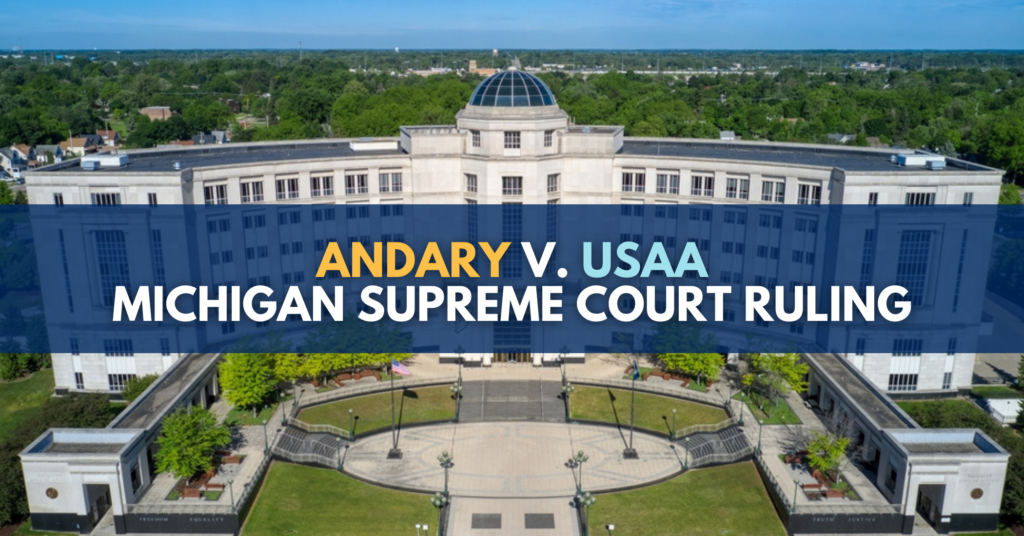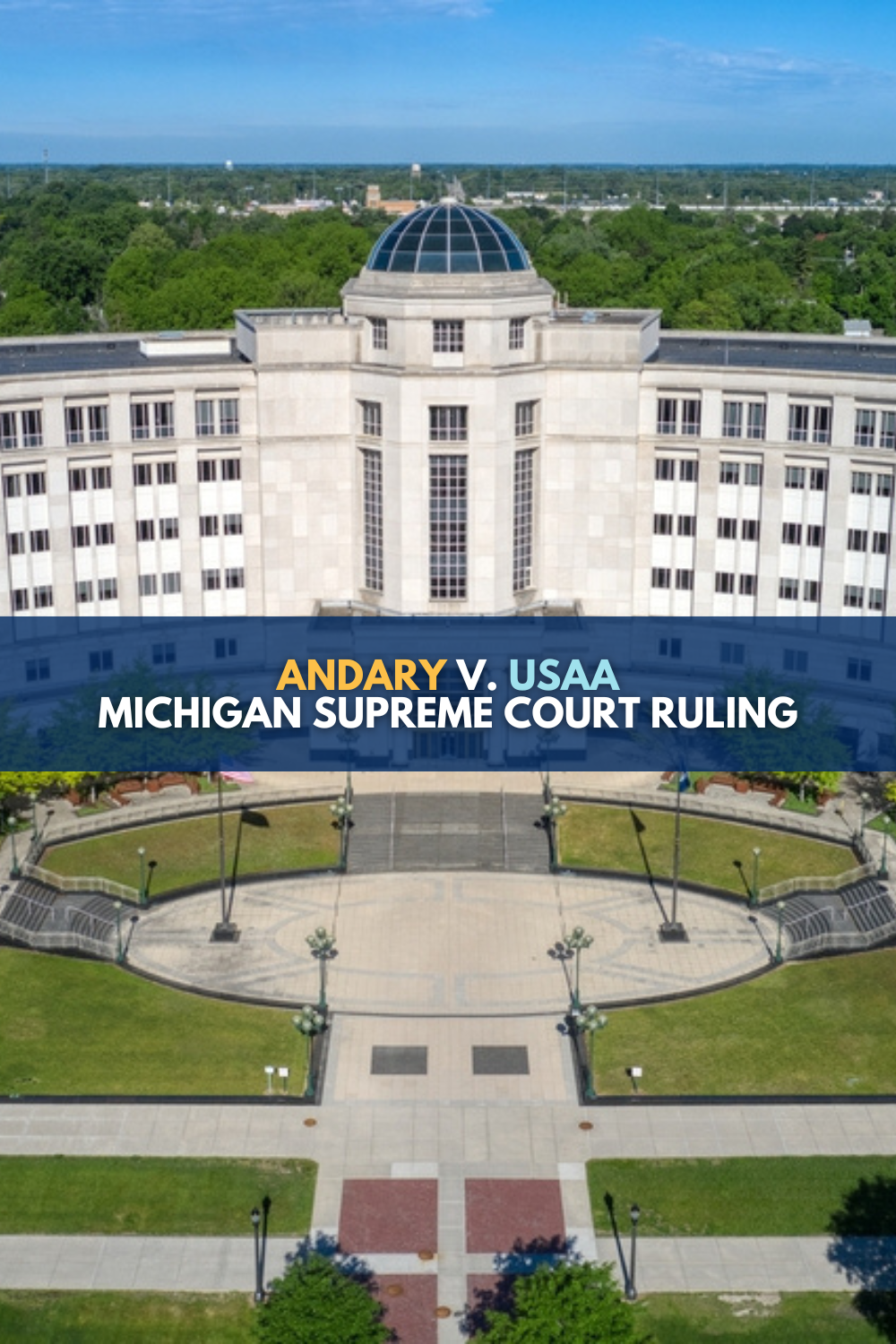
The Andary v. USAA Michigan Supreme Court ruling holds that the No-Fault fee schedule and attendant care limitations that were added to the No-Fault law in 2019 do not apply retroactively to car accident victims who were injured while covered by an insurance policy issued before June 11, 2019.
Specifically, the Andary v. USAA Michigan Supreme Court ruling recognized the following very important legal principles:
- No-Fault auto “insurance policies covering” car accident victims at the time of a crash “bind the insurance companies to their promise to provide PIP benefits under the law that existed at the time of injury to those individuals covered by the policies, and the 2019 no-fault amendments [such as the Medicare-based fee schedule and the limitations on in-home, family-provided attendant care] do not clearly convey an intent to retroactively modify these vested contractual rights.” (Page 2)
- When car crash victims in Michigan “are covered by policies under which premiums were paid with the expectation that uncapped lifetime benefits would be provided for all reasonable and necessary medical expenses,” the Andary v. USAA Michigan Supreme Court ruling announced that the victims’ “vested contractual right to continuation of those benefits at pre-amendment levels cannot be stripped away or diminished when the Legislature has failed to clearly state its intent to do so.” (Page 2)
- “[A]pplication of the 2019 amendments of MCL 500.3157(7)and (10)” to auto accident victims who were “directly covered by a no-fault insurance policy at the time of their accident either as the named insured or as a covered individual under the policy” “would constitute a retroactive reduction of their vested contractual rights to receive uncapped PIP benefits pursuant to the insurance policies and incorporated statutes that existed when they were injured.” (Page 41; also footnote 30)
- “The Legislature did not clearly state that it intended the new fee schedule in MCL 500.3157(7) or the new attendant care limitations in MCL 500.3157(10) to apply retroactively to individuals with a vested contractual right to PIP benefits under the pre-amendment no-fault statutes, which means that these provisions do not apply to any insured who was injured while covered by an insurance policy issued before June 11, 2019.” (Page 41)
- For car accident victims injured before the No-Fault amendments took effect, the Andary v. USAA Michigan Supreme Court ruling declared that “the insurance policies and the disputed portion of the no-fault statutes that existed when [they] were injured control their entitlement to PIP benefits, not the amended provisions enacted by 2019 PA 21 and 2019 PA 22.” (Page 41)
Andary v. USAA Michigan Supreme Court ruling brings long-awaited justice
This announcement from Andary v. USAA Michigan Supreme Court ruling provides long-awaited and long-overdue justice.
Many are at fault for prolonging the horrible anxiety and incredible hardships that auto accident victims have been subjected to until now. I have repeatedly called on lawmakers and DIFS Director Anita Fox to take action to stop Michigan auto insurance companies from misusing and distorting the new No-Fault law’s changes to deny vital medical care to crash survivors and their families. DIFS Director Anita Fox has been particularly disappointing – a true abdication of responsibility of her office protecting Michigan citizens from insurance company abuse.
In the time leading up to the Andary v. USAA Michigan Supreme Court ruling, I have pointed out that even though the case law was always clear that the new No-Fault law could not apply retroactively, nevertheless lawmakers’ failure to make it crystal clear, to include a “grandfather clause” in the amendments to the No-Fault law “punishes car accident victims and medical providers by leaving them subject to restrictions they never agreed to such as coverage limitations and a medical fee schedule whose reductions on reimbursement rates will deny them access to necessary medical care and treatment.” It was always foreseeable that in a state without bad faith or punitive damages laws, that some insurance companies would try to take advantage of this supposed “ambiguity” and suspend PIP benefits to people who desperately depend upon them.
More than two years before the Andary v. USAA Michigan Supreme Court ruling, I called on DIFS Director Fox to step up and protect auto insurance policyholders’ right to No-Fault medical coverage in the face of insurers’ use of “the new auto No-Fault law to improperly deny attendant care for people catastrophically injured in car accidents before the new auto law took effect, denying vital No-Fault medical care and attendant care benefits.”
And I have pointed out that DIFS’s “retroactivity” arguments in its amicus curiae brief filed in the Court of Appeals were not only “dead wrong” but they were so wrong that if they were accepted by the courts they would “exacerbate the real harms that the auto insurance companies have already unleashed on car accident victims with catastrophic injuries who depend on attendant care for their very survival.”
But my repeated calls-to-action – as well as those by survivors, their families and others within the legal community – have been ignored.
Hopefully, with the Andary v. USAA Michigan Supreme Court ruling, justice will finally come to Michigan car crash survivors.
Our heartfelt sympathies go out to those for whom justice comes too late.
DIFS should not be surprised by Andary v. USAA Michigan Supreme Court ruling
DIFS has known for a long time before the Andary v. USAA Michigan Supreme Court ruling that No-Fault changes such as the fee schedule and attendant care limitations could not be applied retroactively, but still DIFS did nothing to stop insurance companies from wrongfully using those provisions to deny and/or drastically No-Fault benefits.
The Andary v. USAA Michigan Supreme Court ruling makes clear that the anguish that car crash survivors and their families have suffered as a result of the new No-Fault fee schedule and attendant care limitations could have been avoided if the DIFS Director had acted on what she knew and stated to be true: that the No-Fault law changes that were passed in 2019 cannot be applied retroactively to crash victims who were injured before the effective date of the new changes.
In public statements more than three years before the Andary v. USAA Michigan Supreme Court ruling, the DIFS Director has acknowledged that No-Fault medical benefits coverage for a crash survivor are determined by the terms of his or her policy at the time of the car accident and, thus, are unaffected by the 2019 changes to the No-Fault law.
For example, the FAQs section on the DIFS “Michigan New Auto Insurance Law” page states:
- The “changes” in the “new auto insurance law” will “apply to policies issued or renewed after July 1, 2020.” (DIFS “Michigan’s New Auto Insurance Page,” FAQs, “Information on Purchasing Auto Insurance,” “Notice”)
- “The new law applies to auto insurance policies issued or renewed after July 1, 2020. If you are already receiving benefits from your auto insurance policy due to injuries from an auto accident prior to the new law’s effective date, you will continue to receive those benefits regardless of the choice you make.” (DIFS “Michigan’s New Auto Insurance Page,” FAQs, “Information on Purchasing Auto Insurance,” “When does the new law take effect?”)
- Medical care for “ongoing health issues from a crash that occurred before the law went into effect” “will still be covered. Your coverage for this accident continues under the terms of your policy at the time of the accident and will continue regardless of any future PIP medical option.” (DIFS “Michigan’s New Auto Insurance Page,” FAQs, “Information on Purchasing Auto Insurance,” “I have ongoing health issues from a crash that occurred before the law went into effect. Will I still get care under the new law?”)
Significantly, the Court of Appeals August 25, 2022, opinion in Andary vs. USAA observed that when asked about No-Fault benefits for a crash survivor whose accident occurred before the 2019 No-Fault changes, the DIFS Director answered:
“With auto insurance it vests or becomes fixed at the benefit on the day of your accident. So your sister having lifetime medical under that policy, will forever have unlimited coverage for the medical costs associated with that accident as long as she needs them. So you’re under the old law, and under the current law, it’s the date of the accident and the coverage that was in place [on that date] that matters for what kind of coverage you have.” (Page 5, footnote 6)
Injured in a car accident? Call Michigan Auto Law now for a free consultation
If you or a loved one was injured in a car accident, you can call us toll free anytime 24/7 at (800) 968-1001 for a free consultation with one of our experienced car accident attorneys. We will answer your questions about your legal rights to pain and suffering compensation, economic damages, auto No-Fault insurance PIP benefits, and settlements in cases like yours. There is absolutely no cost or obligation. You can also get help from an experienced injury attorney by visiting our contact page or chat feature on our website.



